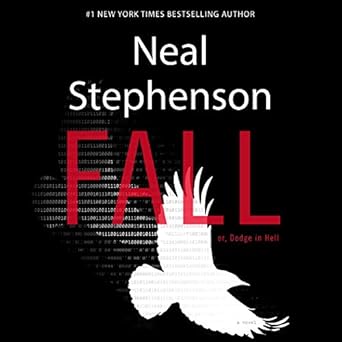![]() Fall, or Dodge in Hell by Neal Stephenson
Fall, or Dodge in Hell by Neal Stephenson
 Richard (“Dodge”) Forthrast, the famous and popular billionaire who created a much-loved video gaming company, unexpectedly dies during a routine medical procedure. Many years previously he had been duped into signing a contract that specified that his brain should be preserved until technology was developed that could scan and upload it to a virtual environment. He never changed his will. Unable to get out of this legal predicament, his family is forced to adhere to his youthful whims.
Richard (“Dodge”) Forthrast, the famous and popular billionaire who created a much-loved video gaming company, unexpectedly dies during a routine medical procedure. Many years previously he had been duped into signing a contract that specified that his brain should be preserved until technology was developed that could scan and upload it to a virtual environment. He never changed his will. Unable to get out of this legal predicament, his family is forced to adhere to his youthful whims.
Dodge’s niece Zula, and her daughter Sophia, who remembers her great-uncle with great fondness, are determined to be part of the creation and evolution of the virtual space where the brains of rich dead people go. Unfortunately, they have a rival — Elmo Shepherd, the man who owns the company that’s got Dodge’s brain. He’s a zealot who’s anxious to create the virtual world as fast as possible because he knows he’s got a genetic disease that causes early-onset dementia. He’s in a race with time to advance the technology as far as he can before he starts losing his faculties.
This is the set-up for a novel that sounds like it will push every one of my science fiction buttons and it’s written by Neal Stephenson, whose smart sci-fi thrillers, such as Reamde and SevenEves, I typically love. Fall, or Dodge in Hell (2019), did push all my buttons right up to the moment that I was anticipating most — when we get to see what Dodge’s brain does when it arrives in the cloud.
 At first this is pretty cool as Stephenson describes the disorientation we might expect when a body-less brain with some fragmentary memories regains consciousness in a totally foreign environment. But then, instead of proceeding in this scientific speculation sort of vein, as I had hoped, the story turns into an origin story / fable / epic that combines a whole bunch of religions, myths, and legends. At this point it feels like a fantasy novel, and not a fun one.
At first this is pretty cool as Stephenson describes the disorientation we might expect when a body-less brain with some fragmentary memories regains consciousness in a totally foreign environment. But then, instead of proceeding in this scientific speculation sort of vein, as I had hoped, the story turns into an origin story / fable / epic that combines a whole bunch of religions, myths, and legends. At this point it feels like a fantasy novel, and not a fun one.
What I was expecting and hoping for was a far-future sci-fi thriller in which we could explore the science, technology, and ethics of uploading the brains of dead people to the cloud while we had a thrilling adventure with those dead but now-conscious brains. There is some of this, but the fantasy context makes it seem that Stephenson was more interested in integrating a variety of religions and myths into a super-myth (like superstring theory) than in exploring the possibilities and consequences of living in a virtual world after death.
Neal Stephenson is not my bitch and it’s perfectly fine if he doesn’t take a book where I want him to go with it, but the problem was that the story I was so eager for (based on the book’s blurb and where the story seemed to be going until the halfway mark) was exciting but his long disjointed fantasy epic seemed pointless, tedious, and passionless. And there are so many long scenes throughout the novel that ended up having nothing to do with the plot.
I was disappointed. With that said, I’ll give Stephenson credit for some excellent story-telling, nice characterization, appealing dry humor, a few hilarious scenes, and some wonderful imagery including a set of recurring motifs that served to make a long rambling story feel more cohesive as well as to address the science behind how particular components of memory could give rise to Dodge’s experience in the cloud. And, as always with Stephenson’s work, there is a lot to learn and think about in Fall, or Dodge in Hell, which I appreciate. And, for fans, some Easter Eggs such as the appearance of some Waterhouses and Shaftoes.
The audio edition of Fall, or Dodge in Hell, produced by Brilliance Audio, is excellent. It’s read by the delightful Malcolm Hillgartner, a professional actor, playwright, and songwriter. It’s 32 hours long which is way too long.



32 hours? o.O At least when I’m reading his chunksters I can speedread.
Well, once I got to know the characters, I gradually sped up the audio to about double speed.